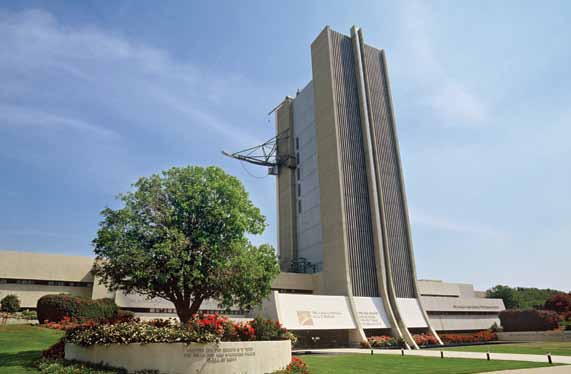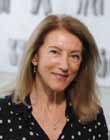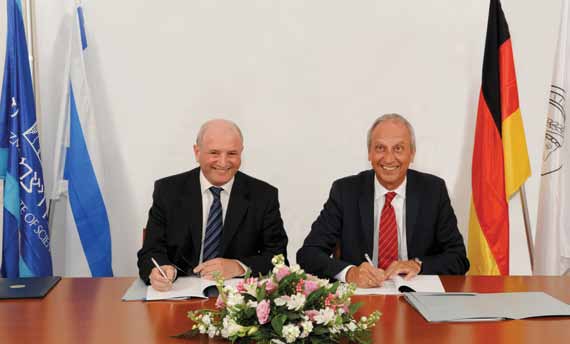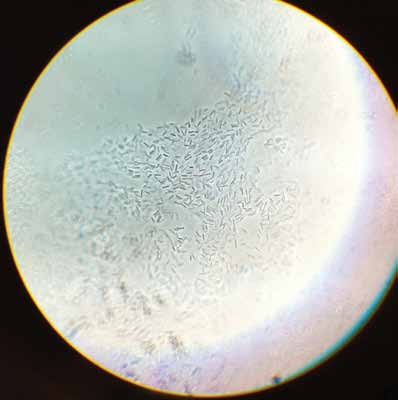Personalized Medicine Up and Working
While the conversion of the Institute’s iconic solar tower into labs for the Israel National Center for Personalized Medicine (INCPM) got under way in October, its four units are already up and working in various temporary locations around the Institute. Dr. Berta Strulovici, a Weizmann alumna, heads the INCPM; she is working closely with a steering committee headed by Prof. Aharon Ciechanover and representatives of Israeli research institutes and universities, hospital medical research units and pharmaceutical R&D.
Dr. Daniela Zalcenstein, also a Weizmann Institute alumna, who previously held a joint position in the Biological Services Department and in Dr. Ido Amit’s lab, heads the Crown Institute for Genomics. She and her staff are building a unit that employs the most advanced genome sequencing technologies. Their goal is to combine sequencing services with research and development, focusing on overcoming the bottlenecks and limitations associated with assay development, automation and data analysis.
The de Botton Institute for Protein Profiling is headed by Dr. Yishai Levin, who also moved from Biological Services. This unit ultimately aims to take the guesswork out of finding proteins that that are involved in disease: It will characterize large numbers of proteins, enabling researchers to identify interactions among proteins and the modifications they undergo as they interact.
The high-throughput screening unit (HTS) is headed by Dr. Haim Barr, hired this year. Barr comes to the INCPM with extensive experience in biomedical R&D. With the capability of screening up to 100,000 compounds at a time, the HTS will build a database of information that can be shared by academic, medical and industry researchers to identify possible new drugs.
The bioinformatics unit is headed by Weizmann alumnus Dr. Rami Jaschek. In addition to helping researchers deal with the growing mountains of data obtained in life-sciences and biomedical research, this unit will develop graphic interfaces to make data analysis accessible and a “programmatic environment” to help create new computational tools.
The plan is for the “start-up” phase of the refurbishing to be completed at the beginning of 2013, and the first units, Genomics and Bioinformatics, to move in at that time. The final move, of the HTS, will take place sometime in 2014.
Joint Archaeology Center
Hailing the establishment of the new Max Planck–Weizmann Institute of Science Center in the Field of Integrative Archaeology and Anthropology in January, Prof. Jean-Jacques Hublin said that the Weizmann Institute’s Helen and Martin Kimmel Center for Archaeological Science and the Max Planck Institute for Evolutionary Anthropology are “two of the world’s most innovative research centers in the field of archaeological science and the study of bone development.” The Max Planck Institute’s Hublin is one of the Center’s two directors; the other is Prof. Stephen Weiner of the Weizmann Institute.
The Center is the latest addition to the welldeveloped and multifaceted cooperation between the Max Planck Society and the Weizmann Institute. Activities in the Center are undertaken by two groups of scientists, one in Israel and the other in Germany, each consisting of approximately 10 scientists and students.
Research into such subjects as cultural change and the evolution of humans will be based, in part, on the Weizmann Institute’s experience and know-how in using advanced chemistry techniques to decipher the past. This expertise will encompass a soon-tobe- installed accelerator mass spectrometer, designed especially for archaeological research, which will enable the Weizmann team to directly measure minute quantities of carbon 14 with a dating precision of 20-40 years. The gift that enabled the purchase of the spectrometer came from Dr. Naim Dangoor CBE of London, founder and head of the Exilarch’s Foundation, which supports community and educational causes. Dr. Elisabetta Boaretto was recently appointed track leader by an international selection committee.
In addition, the teams will make use of highresolution computer tomography techniques developed at both the Max Planck Institute and the Weizmann Institute to perform reconstructions of bones and teeth down to the level of micron-sized details.
Synergy in Energy Research
A joint initiative that will pump new energy into solar and biofuels research is under way. The Leona M. and Harry B. Helmsley Charitable Trust Program in Alternative Energy will underwrite collaborative research projects at the Weizmann Institute of Science and the Technion – Israel Institute of Technology. Heading this program – New Options for Solar Energy Conversion to Electricity and Biofuel – are the Institute’s
Prof. David Cahen and the Technion’s Prof. Gideon Grader.
Cahen and Grader bring to the program their respective alternative energy research bases: the Institute’s Alternative Energy Research Initiative (AERI) and the Grand Technion Energy Program (GTEP). In addition, Prof. Avraham Levy, who heads AERI’s biofuel consortium, and his colleagues work with Grader and Technion scientists in the Israeli Center of Research Excellence (ICORE) in alternative energy. In addition to the synergy that will arise out of combining the basic research approach of the Weizmann Institute with that of the Technion’s advanced engineering, the program will provide facilities and support for scientists from a wide range of fields, including genetics and plant sciences, chemistry, physics and engineering.
Initially, the Program will focus on three main areas: biofuels, photovoltaics and optics for light harvesting. State-of-the-art facilities that are currently being established in the Weizmann Institute will enable researchers to advance their work on plants and algae that can be sustainably grown for biofuel, as well as methods to efficiently break down plant-based waste materials into useful fuels. The photovoltaics and optics researchers are engaged in efforts to better harvest sunlight and convert light to electricity in smart, low-cost ways. Among other things, they will be developing new materials, some of them, such as nanomaterials and metamaterials, on the cutting edge of materials research.



